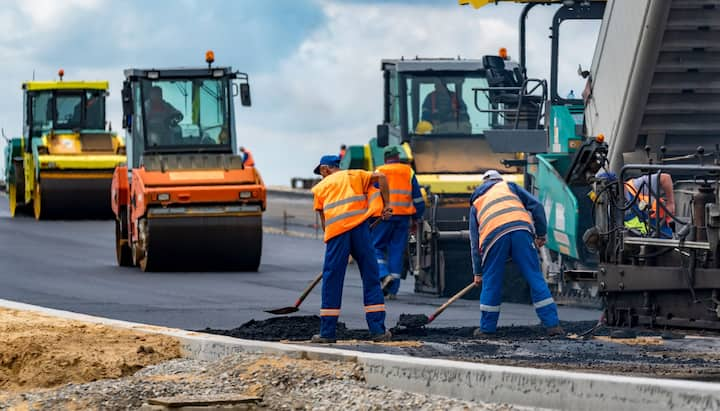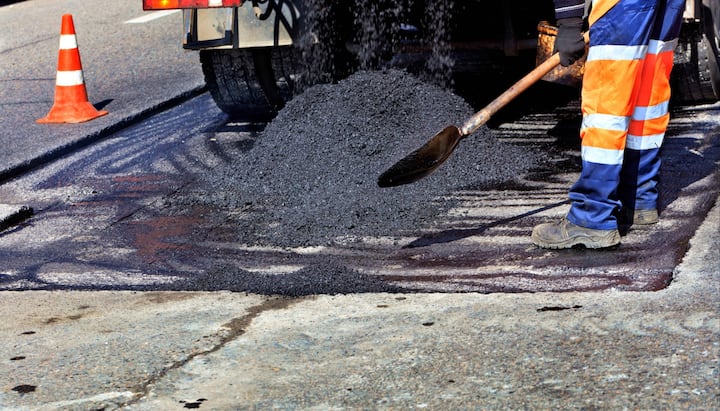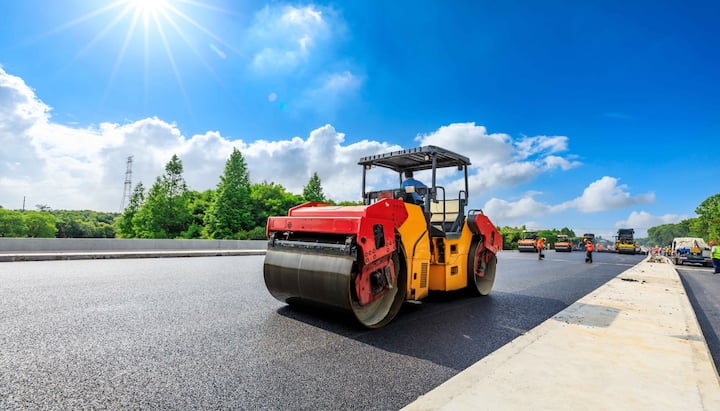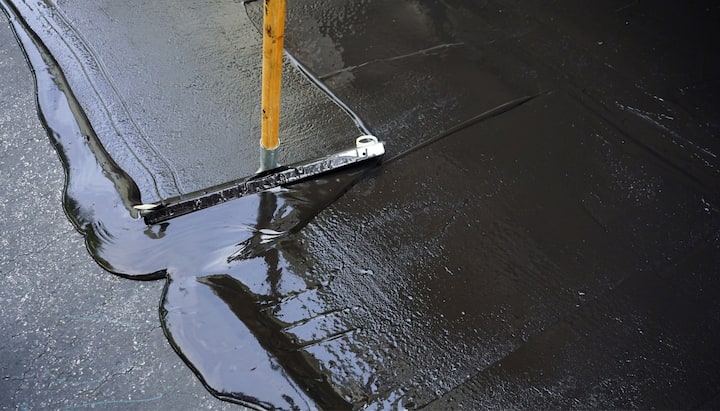Asphalt Contractors of Ann Arbor: Your Trusted Paving Experts
Are you seeking reputable asphalt contractors in Ann Arbor for your next paving project? Look no further than our experienced team. We are committed to delivering exceptional asphalt services that will meet your every need.
- Unrivaled Expertise: Our certified professionals possess a deep understanding of asphalt paving techniques, ensuring optimal results for every project.
- Customized Solutions: We tailor our services to meet your unique requirements, from small residential driveways to extensive commercial parking lots.
- Premium Materials: We utilize high-quality asphalt materials to guarantee durable and long-lasting surfaces that withstand the elements.
- Efficient Workmanship: Our team’s swift and precise execution ensures timely project completion without compromising quality.
- Clear Communication: We maintain open communication throughout the project, keeping you informed of every step and addressing any concerns promptly.
- Exceptional Customer Service: Your satisfaction is our priority. We strive to exceed your expectations with responsive service and attention to detail.
Whether you require new asphalt installation, repairs, or resurfacing, our team is equipped to handle it all. Contact us today for a free consultation and experience the difference with the leading asphalt contractors in Ann Arbor.

About Us
Looking for Expert Asphalt Paving Contractors in Ann Arbor, Michigan?
Your search for reliable asphalt paving services in Ann Arbor ends here. Our team of seasoned professionals possesses the expertise and experience to handle any asphalt paving project, big or small. We take pride in our commitment to delivering exceptional results and customer satisfaction. Our comprehensive range of services includes asphalt installation, repair, maintenance, and resurfacing. We utilize state-of-the-art equipment and premium materials to ensure durable and long-lasting results. Whether you’re a homeowner looking to enhance your driveway or a commercial property owner in need of a comprehensive parking lot paving solution, we are here to assist you. We understand that every project is unique, which is why we approach each one with meticulous attention to detail. Our team will work closely with you to assess your specific requirements, provide tailored recommendations, and ensure that the final product aligns with your vision. Choose us as your asphalt paving contractor in Ann Arbor and experience the difference. Contact us today for a free consultation and let us demonstrate how our expertise and commitment to excellence can transform your property.
What Is Asphalt?
Asphalt is a mixture that blends binder, filler, and aggregates. Constructors and road maintainers use it for building railway tracks, airport runways, bicycle lanes, parking lots, sports arenas, and sidewalks. Generally, the aggregates used for the mixture include sand, slags, crushed rock, and gravel. However, a few people have recently started adding waste and byproducts to increase the life of the asphalt.
The byproducts typically include other construction materials, which vary per company. Experts use a binder to bind the aggregates and turn them into a strong material. While bitumen is a standard binder, bio-based binders are also used to minimize the effect of environmental stressors.
A standard asphalt pavement contains bituminous bound materials. This allows the path to distribute the mixture before loads of vehicles arrive on it. Note that pavements do not consist of asphalt alone. Instead, it contains several layers. These may include the subgrade, formation layer, unbound sub-base, unbound-road base, and finally, asphalt layers.
Since When Has Asphalt Been Used As A Construction Material?
Because people have rarely heard about asphalt – not surprising, anyone would be least interested in knowing the materials used in road construction – many assume it’s a relatively newer product. However, it existed as long as the history books. It occurs naturally in asphalt rocks and lakes. The term “asphalt” comes from the Greek “asphaltos.” Literally, the term means something “safe” or “secure.” In ancient times, individuals used this material to seal ships. Besides, the Mesopotamians utilized it to make temple baths and water tanks waterproof. Moving forward, Pharaohs also benefitted from this material. For example, the Egyptians used it along river Nile banks to prevent erosion. Asphalt was also used to build a road in Babylon in 625 BC. Additionally, Romans waterproofed their aqueducts using asphalt. So, the more humans knew about its usage, the more they started utilizing it. Even today, it is used to construct water reservoirs in America. Further, numerous construction companies use it to build and strengthen roads and make pathways smoother and convenient for pedestrians and drivers alike.
Interesting Facts About Asphalt
Asphalt plays a critical role in shaping the sidewalks and driveways. While its quality drastically impacts its performance, all asphalt types serve a common purpose: building and strengthening roads. We’ve enlisted a few exciting facts about asphalt to give you an in-depth understanding of how it works.
- Asphalt is a durable material. However, its durability depends on the aging of the asphalt binder. Generally, the viscosity of asphalt binder increases with time, making it stiffer and reducing its quality.
- Asphalt might result in the flash point. Like most construction materials, asphalt volatilizes at incredibly high temperatures, releasing vapor to increase the volatile concentration resulting in a flash. However, industry experts test and control asphalt to avoid this problem.
- Asphalt gives a smooth appearance to roadways. Besides, if you love riding bikes, expect a comfortable ride on quality asphalt material.
- Roads constructed with top-notch asphalt reduce noise levels.
- Asphalt also benefits airports allowing for safe landings.
- The many advantages of asphalt might make you think it is expensive, but that’s not the case. This material is cost-effective and adds value to driveways and sidewalks.
- The latest asphalt technology ensures better water drainage, reducing muddy and watery paths in the middle of the road.
- Colored asphalt is a thing, and many construction workers use it. However, it is utilized for specific purposes – to alert drivers regarding dangerous areas like sharp edges that might lead to accidents.
Request a Quote
Different Types Of Asphalt
Hot Mix Asphalt
Hot asphalt is made at temperatures between 160-180C. Because it is produced at such high temperatures, it won’t be wrong to consider it one of the most durable asphalt mixtures. Therefore, it is ideal for high-traffic areas – think airport runways or highways.
Warm Mix Asphalt
This mix is not made at high temperatures. As such, it requires less energy and fewer fumes. Although it is a safe material for constructors and the environment, it doesn’t provide the type of robustness hot mix asphalt gives. Therefore, it is better for low-traffic paths and light vehicles.
Emulsified Asphalt
This type of asphalt suspends small cement granules into the water, followed by an emulsifying agent – typically soap. They are less viscous than plain asphalt and are ideal for low-temperature areas. After its application, the water evaporates, and the cement is left.
Foamed Asphalt
This is produced by mixing hot asphalt binder in cold water. When the water touches the hot asphalt, it forms steam and traps in the binder bubbles. As such, it produces a high volume yet thin asphalt foam. This foam only lasts for some time, and the binder reshapes into its original form.
Cutback Asphalt
It combines asphalt cement and petroleum solvent. Therefore, it is also less viscous and a better option for low-temperature applications. The petroleum solvent evaporates when the cutback asphalt is applied, and only the cement is left behind. While cutback asphalt is a reliable option, most companies avoid using it for good reasons. First, it is costly. Second, it can be an environmental problem.
Thin Overlays
Thin overlays are an excellent option for improving riding quality and reducing noise levels. It is typically made from recycled materials and warm-mix asphalt.
Porous Asphalt
The history of this asphalt type can be traced back to the 1970s. Construction workers typically use it in parking lots to allow for water drainage. Also, it’s a budget-friendly option and lasts for years to come, which is a plus.
Is Asphalt a Reliable Material for Ann Arbor Roadways?
As a construction material, asphalt has been widely used in the paving of roads, parking lots, and driveways. Its reliability and durability make it a popular choice for various applications. Here are a few reasons why asphalt remains a trusted solution for Ann Arbor roadways:
- Durability: Asphalt can withstand heavy traffic loads and extreme weather conditions, making it ideal for areas with high volumes of vehicles.
- Cost-effective: Compared to other paving materials, asphalt is a cost-effective option, reducing construction and maintenance expenses.
- Flexibility: Asphalt’s flexibility allows it to adjust to ground movements and temperature fluctuations, minimizing cracking and wear.
- Skid Resistance: Asphalt surfaces provide excellent skid resistance, enhancing safety for vehicles, especially during wet or icy conditions.
- Noise Reduction: Asphalt pavements absorb noise better than other materials, creating a quieter environment for nearby communities.
By choosing asphalt for Ann Arbor roadways, you can expect long-lasting performance, cost savings, and improved safety for years to come.
Asphalt
Is There An Issue Living By An Asphalt Plant?

Asphalt plants are industrial facilities that produce asphalt, a material used in paving roads and other surfaces. While they provide essential infrastructure, there are potential concerns for people living nearby. Understanding the potential issues can help you make informed decisions about living in proximity to an asphalt plant. Noise pollution is a primary concern. Asphalt plants operate heavy machinery that can generate significant noise levels. This noise can be disruptive to daily life, affecting sleep, concentration, and overall well-being. The proximity of the plant to your home will influence the noise levels you experience. Odor is another potential issue. Asphalt plants emit a distinctive odor during production and storage. While the odor may not be harmful, it can be unpleasant for some people. The prevailing wind direction and distance from your home to the plant can affect the odor you encounter. Air quality is also a consideration. Asphalt plants release particulate matter and other emissions into the air. While regulations are in place to minimize these emissions, there may still be concerns for people with respiratory conditions or allergies.
Does Asphalt Thickness Matter?
Asphalt thickness is a crucial factor that determines the lifespan, durability, and overall quality of your pavement. It directly influences the structural integrity of the surface, its ability to withstand heavy traffic loads, and its resistance to cracking and deformation. The optimal asphalt thickness depends on several factors, including the intended use of the pavement, the expected traffic volume, and the local climate conditions in Ann Arbor. Generally, residential driveways and walkways require a minimum of 2 inches of asphalt, while commercial parking lots and highways may require 4 inches or more. Thinner pavements are more susceptible to cracking and damage under heavy loads and extreme weather conditions. Conversely, thicker pavements provide increased strength and resilience, ensuring a longer lifespan and reducing the need for frequent repairs. It is important to consult with a qualified asphalt contractor to determine the appropriate thickness for your specific application in Ann Arbor. By investing in proper asphalt thickness, you can enhance the performance, longevity, and overall value of your pavement. It will not only save you money on costly repairs in the future but also provide a safe and reliable surface for years to come.
Did We Miss Anything?
Go ahead and give us a call if you are searching for any of the below:
- Asphalt Ann Arbor MI
- Asphalt companies Ann Arbor
- Asphalt paving Ann Arbor MI
- Asphalt paving contractors in Ann Arbor
- Asphalt maintenance services in Ann Arbor
- Asphalt Paving service Ann Arbor

